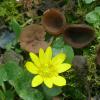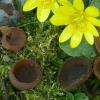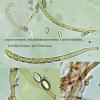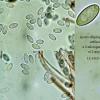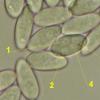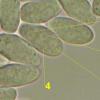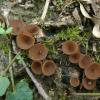
04-04-2025 11:56
 Edvin Johannesen
Edvin Johannesen
These 0.2-0,4 mm diam. flat to slightly convex, gr

03-04-2025 21:31
 Francois Guay
Francois Guay
Hi, I found this interesting ascomycete on incuba

03-04-2025 18:26
Lennert GeesHello there!I found this species on dung of an unk

03-04-2025 16:45
Me mandan el material seco de Galicia (España),

01-04-2025 23:18
Yanick BOULANGERBonsoirRécolté par un ami sur dans un tas de bra

29-03-2025 09:08
 Martine Vandeplanque
Martine Vandeplanque
Bonjour.J’ai essayé d’étudier un Daldinia.Qu

30-03-2025 10:24
Gonzalez Garcia MartaGood morning, I would like to know the opinion of
Dumontinia tuberosa sur Ranunculus ficaria ?
Bernard CLESSE,
14-04-2018 08:26
 Bonjour à toutes et tous,
Bonjour à toutes et tous,Je pense avoir trouvé Dumontinia tuberosa sur Ranunculus ficaria (pas d'Anemone nemorosa proche) mais je n'arrive pas à vraiment voir clair par rapport à Sclerotinia sclerotiorum/S. ficariae.
D'autre part, je n'arrive pas à être sûr de la synonymie Sclerotinia sclerotiorum = S. ficariae. Est-ce le cas ?
Ici les apothécies ont un diamètre de 1,2-1,7 cm.
Merci d'avance pour vos avis et articles sur le sujet.
Bernard
Hans-Otto Baral,
14-04-2018 11:49

Re : Dumontinia tuberosa sur Ranunculus ficaria ?
Hi Bernard
wonderful photos. This is the common but undescribed S. binucleata which is on Ficaria and Corydalis and sharply differs from S. tuberosa on Anemone by two- instead of four-nucleate spores.
The apo diameter excludes S. ficariae which is a synonym of S. sclerotiorum.
Could you please tell me the collection data?
Zotto
wonderful photos. This is the common but undescribed S. binucleata which is on Ficaria and Corydalis and sharply differs from S. tuberosa on Anemone by two- instead of four-nucleate spores.
The apo diameter excludes S. ficariae which is a synonym of S. sclerotiorum.
Could you please tell me the collection data?
Zotto
Alain BRISSARD,
14-04-2018 11:59
Re : Dumontinia tuberosa sur Ranunculus ficaria ?
Bonjour Bernard
A mon humble avis tu es en présence de Sclerotinia ficariae et l'absence d'anénome sylvie et la présence de spores à 2 noyaux parlent en faveur de S. ficariae alors qu'il ya 4 noyaux perceptibles chez tuberosa.
Il me semble que la taille moyenne des spores chez ficariae est légèrement plus petite que chez D. tuberosa (où je trouve 14 - 17 x 6- 8)
Il parait que l'excipulum ectal est différent chez ces 2 espèces , mais là je ne suis pas à même de t'aider.
Alain
Peut-être que les spécialistes pourront confirmer mes remarques
A mon humble avis tu es en présence de Sclerotinia ficariae et l'absence d'anénome sylvie et la présence de spores à 2 noyaux parlent en faveur de S. ficariae alors qu'il ya 4 noyaux perceptibles chez tuberosa.
Il me semble que la taille moyenne des spores chez ficariae est légèrement plus petite que chez D. tuberosa (où je trouve 14 - 17 x 6- 8)
Il parait que l'excipulum ectal est différent chez ces 2 espèces , mais là je ne suis pas à même de t'aider.
Alain
Peut-être que les spécialistes pourront confirmer mes remarques
Bernard CLESSE,
14-04-2018 13:33

Re : Dumontinia tuberosa sur Ranunculus ficaria ?
Big thanks for your answer and your very interesting explanation, Zotto! With this Sclerotinia binucleata, I understand better then all these bizarre intermediate cases of Sclerotinia that did not allow us to really agree with S. tuberosa or S. ficariae!
If I do not abuse : does Dumontinia tuberosa have priority over Sclerotinia tuberosa or is it the opposite and is there a Sclerotinia / Dumontinia key?
I'm sending you the data tonight.
Best regards,
Bernard
Bernard CLESSE,
14-04-2018 13:35

Re : Dumontinia tuberosa sur Ranunculus ficaria ?
Bonjour Alain,
Grand merci pour ton message et les photos de spores de Dumontinia tuberosa. Avec ce Sclerotinia binucleata, j'ai l'impression que beaucoup de choses s'éclaircissent !
Affaire à suivre…… :o)
Bernard
Grand merci pour ton message et les photos de spores de Dumontinia tuberosa. Avec ce Sclerotinia binucleata, j'ai l'impression que beaucoup de choses s'éclaircissent !
Affaire à suivre…… :o)
Bernard
Mario Filippa,
14-04-2018 13:44
Re : Dumontinia tuberosa sur Ranunculus ficaria ?
"Dumontinia tuberosa have priority over Sclerotinia tuberosa or is it the opposite"
Obviously Sclerotina is an older name than Dumontinia, but the choice between the two is taxonomic, not nomenclatural. When you think that this species must belong to the same genus as Sclerotinia libertiana (type species of Sclerotina), you have to use Sclerotinia tuberosa. If you think these two species are different enough to belong to two different genera, then Dumontinia tuberosa is right.
Regards
Mario
Obviously Sclerotina is an older name than Dumontinia, but the choice between the two is taxonomic, not nomenclatural. When you think that this species must belong to the same genus as Sclerotinia libertiana (type species of Sclerotina), you have to use Sclerotinia tuberosa. If you think these two species are different enough to belong to two different genera, then Dumontinia tuberosa is right.
Regards
Mario
Bernard CLESSE,
14-04-2018 18:06

Re : Dumontinia tuberosa sur Ranunculus ficaria ?
OK thank you for your explanation, Mario !
Best regards,
Bernard
Best regards,
Bernard
Bernard CLESSE,
15-04-2018 19:22

Re : Dumontinia tuberosa sur Ranunculus ficaria ?
Voici une autre photo de Sclerotinia cf. binucleata, photographiée dans la même vallée et le même jour que la première récolte.
Bien que je ne l'ai pas reprise, la taille des apothécies et l'écologie (avec Ranunculus ficaria) vont bien avec l'hypothèse Sclerotinia binucleata.
Bernard
Bien que je ne l'ai pas reprise, la taille des apothécies et l'écologie (avec Ranunculus ficaria) vont bien avec l'hypothèse Sclerotinia binucleata.
Bernard
Hans-Otto Baral,
15-04-2018 20:34

Re : Dumontinia tuberosa sur Ranunculus ficaria ?
I would not be sure. S. binucleata and S. tuberosa have +/- the same size and appearance, and they may occur a few meters from each other. Sometimes the Anemone disappeared the last day, maybe through parasitism by the Sclerotinia, and the Sclerotinia now grows on a naked place with Ficaria around.
Bernard CLESSE,
15-04-2018 21:01

Re : Dumontinia tuberosa sur Ranunculus ficaria ?
OK Zotto, thank you for your clarification! An observation under a microscope is therefore really necessary.
Bernard
Bernard
